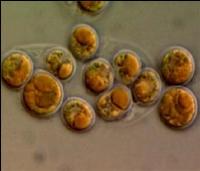Hydrothermal Conversion of Microalgae to Biofuels
Researchers: Michael Johnson, Andrew Peterson
Principal Investigator: Professor Jefferson Tester
 Biomass feedstocks based on algae represent a potential source of third generation biofuels that can be produced on land not currently used for agriculture. In contrast, biofuels that use terrestrial grown energy crops as feedstocks compete with food production for land, water and other resources. Even though the US is a land rich country, the amount of arable land is still finite and measurably less than would be needed to supplant our gasoline and diesel fuel demands. Algal biofuels have the potential to replace all of the petroleum in the US without competing for arable land or fresh water. In optimal situations with suitable light and carbon dioxide, cultivated microalgae can grow 5 times as much biomass as corn per acre, and produce 10 times the oil as could be obtained from oil palm in a year in the same area. Future improvements resulting from research could push these figures up by another factor of 5 and 10, respectively.
Biomass feedstocks based on algae represent a potential source of third generation biofuels that can be produced on land not currently used for agriculture. In contrast, biofuels that use terrestrial grown energy crops as feedstocks compete with food production for land, water and other resources. Even though the US is a land rich country, the amount of arable land is still finite and measurably less than would be needed to supplant our gasoline and diesel fuel demands. Algal biofuels have the potential to replace all of the petroleum in the US without competing for arable land or fresh water. In optimal situations with suitable light and carbon dioxide, cultivated microalgae can grow 5 times as much biomass as corn per acre, and produce 10 times the oil as could be obtained from oil palm in a year in the same area. Future improvements resulting from research could push these figures up by another factor of 5 and 10, respectively.
Current schemes for producing algal biofuel involve large amounts of energy and solvents to recover the oil from the algal biomass. The algae are very dilute in water, and must be de-watered significantly in these processes. However, hydrothermal processing is well-suited to very wet biomass. Hydrothermal processes can be used to convert a wide range of biomass into fuels. The special features of high-pressure, high-temperature water allow for chemical reactions that could not occur under other conditions. In this research, algae are subjected to hydrothermal conditions in a batch reactor system in our laboratory. The products are analyzed to discover the fate of the different portions of the algal biomass. Model compounds are also reacted in hydrothermal environment to improve understanding of reaction pathways and rates in hydrothermal systems.